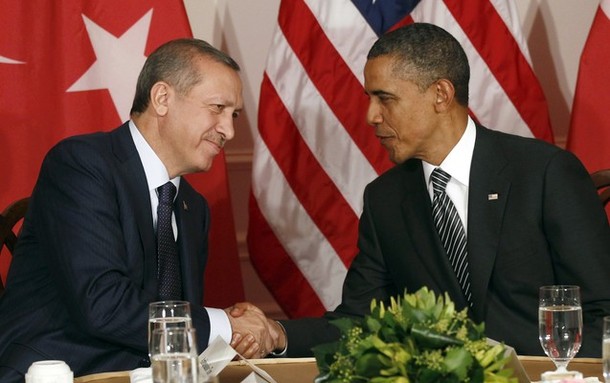
From Soner Cagaptay, the Washington Post: Today, however, the United States and Turkey are on a honeymoon, with President Obama and Prime Minister Recep Tayyip Erdogan having formed what is probably the best relationship between a U.S. president and a Turkish prime minister in decades. The shifting political winds across the Middle East are also bringing Turkey and the United States closer than they have been since their falling-out in 2003 over the Iraq war.
Obama and Erdogan seem to have really hit it off: Turkish media outlets reported that after Erdogan’s mother died last month, Obama was among the world leaders who called him and that the two “spoke for 45 minutes about their feelings.” This personal rapport is the foundation of the new U.S.-Turkish relationship. . . .
In June 2010, for example, Turkey voted at the U.N. Security Council against a proposal for U.S.-sponsored sanctions. For about two months, it looked as though this vote would sever U.S.-Turkish ties. But the straightforward conversation Obama had with Erdogan on the sidelines of the Group of 20 summit in Toronto in July 2010 changed everything.
Obama told Erdogan how upsetting Turkey’s U.N. vote had been to him, and his candor helped clear the air between the two, as Turkish and U.S. officials and friends have told me. . . .
Since the summer, the relationship has been on the upswing. The two leaders speak often — at least a dozen times this year alone — and frequently agree on policy. Consider their consensus on the Arab Spring. Turkey’s statements on the uprisings in Middle Eastern and North African nations pushed Obama to appreciate Turkey — a large, Muslim NATO member that uniquely satisfies Obama’s quest to find powerful allies that have a majority-Muslim population and are happy to work with the United States. . . .
In the long term, the Turkish-Iranian rivalry will bring Ankara closer to Washington, and perhaps even to Israel. For instance, when the United States completes the withdrawal of its troops from Iraq, Turkey and Iran will be competing economically and politically to gain influence in Iraq.
After a decade of discord with the United States, Turkey has come in from the cold. While the Obama-Erdogan relationship has established a new foundation for U.S.-Turkish ties, the two countries will be bound by common interests in the Middle East even after these leaders leave office.
Soner Cagaptay, a senior fellow at the Washington Institute for Near East Policy. (photo: Reuters)
Image: reuters%209%2021%2011%20Erdogan%20Obama.jpg
